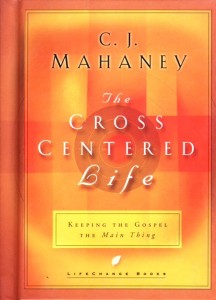 George Orwell once noted, “Sometimes the first duty of intelligent men is the restatement of the obvious.”
George Orwell once noted, “Sometimes the first duty of intelligent men is the restatement of the obvious.”
In his short book The Cross Centered Life author CJ Mahaney writes, “Sometimes the most obvious truths are the ones we need to be reminded of the most” (15). What then is the truth he aims to remind the reader of? Simply put, the gospel. “Perhaps the purpose of this book is to restate the obvious, yet of-neglected, truth of the gospel, to bring it before you one more time” (16). Mahaney’s working definition of the gospel is simple and solid, “Jesus Christ died so that sinners would be reconciled to God and forgiven by God” (11).
THREE HEART TENDENCIES
Yet, Mahaney knows how difficult it can be to keep that which is of “first importance” central to our daily lives. A fair portion of the book is devoted then to “three main tendencies” that can draw our hearts away from the gospel:
- Legalism: Basing our relationship with God on our own performance.
- Condemnation: Being more focused on our sin than on God’s grace.
- Subjectivism: Basing our view of God on our changing feelings and emotions.
Mahaney quotes Tom Schreiner to show the serious danger legalism, writing, “Legalism has its origins in self-worship. If people are justified through their obedience to the law, then they merit praise, honor, and glory. Legalism, in other words, means the glory goes to people rather than God” (25). Mahaney is wise to remind the reader that breaking free from legalism doesn’t mean you stop reading the Bible, obeying God, or praying with disciplined dedication. Rather, the core issue is an appropriate understanding of the relationship between justification and sanctification. Although the two works of God cannot be separated, they are nonetheless distinct. The legalist problem is that “he confuses his own ongoing participation in the process of sanctification with God’s finished work in justification” (33). Further, “the legalist allows his performance of spiritual duties to become his preoccupation and a source of self-righteous pride. In doing so, he unwittingly walks away from the main thing – the gospel” (34-35).
The second human tendency that draws one away from the gospel is condemnation. It’s danger is found in how it feeds upon sinful flesh. “In its opposition to God, our flesh will tell us that Jesus’ sacrifice couldn’t possibly be enough to win the Father’s favor completely, unreservedly, and forever” (42). The answer to condemnation is quite simple, “Confess you sin to God. Then believe in Him. Exercise the gift of faith that God has given you to believe that Jesus died for the very sins you’re being condemned for” (43). Yes, every sinner is worthy of condemnation, but the Christian is set free from such crippling baggage because of the glorious work of Christ on the cross.
The third danger is that of subjectivism. The average evangelical orientation is inward and subjective. We base our view of God and His view toward us based on fleeting emotions. Mahaney’s remedy for this problem is tried and true: spend more time looking outward – at the finished work of Christ – than inward. “Being your day and at numerous points throughout the day ‘admiring, exploring, expositing, and extolling Jesus Christ’” (51).
So what does the cross centered life look like in everyday life? Mahaney says, “A cross centered life is made up of cross centered days” (54). Cross centered day will be occupied with two primary realities: preaching the gospel to yourself and fanning gospel affection into flame. This second reality is fueled by memorizing the gospel, praying the gospel, singing the gospel, studying the gospel, and reviewing your day in light of the gospel.
The book closes with a wise exhortation, “Never move on from [the gospel]. Jesus died for your sins. May every day be lived by His grace alone. May you know the joy and peace of the cross centered life” (85).
INFLAMING GOSPEL EXCITEMENT
I last read this book in December of 2010 and loved it. Three years later I find myself even more appreciative of Mahaney’s pastoral sensitivity. He steers clear of the redundancy and reductionism that can mark contemporary gospel-centered parlance. On a side note, should this book have been published any time after 2008 (it was originally published in 2002) I bet it would be titled The Gospel Centered Life. Mahaney would have been wise to have some reflection on Christ’s resurrection and ascension, yet the focus on Calvary is warranted and it comes with great warmth.
The gospel clearly affects CJ Mahaney and its inflaming power permeates everything in this little book. Although you can read it in less than an hour, its influence on your life will likely be measured by months and years.
